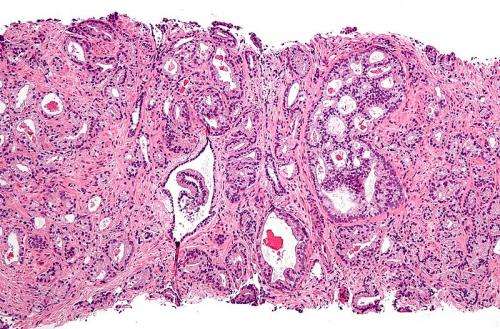ENZAMET shows promise as prostate cancer treatment
ENZAMET shows promise as prostate cancer treatment

A new drug combination for men with advanced prostate cancer has shown sustained increase in survival rates.
The results from the clinical trial of ENZAMET, co-chaired by Professor Christopher Sweeney, Director of the South Australian immunoGENomics Cancer Institute (SAiGENCI) that operates within the University of Adelaide, have been published today in The Lancet Oncology.
For people with metastatic hormone-sensitive prostate cancer, the addition of an androgen receptor blocker with enzalutamide to standard therapy—suppression of testosterone, with or without chemotherapy—led to a 67 percent survival rate after five years.
This compares to 57 percent of people who were alive after five years after receiving the standard best practice treatment.
ENZAMET (ANZUP 1304) is a global collaborative investigator-initiated trial led by the Australian and New Zealand Urogenital and Prostate Cancer Trials Group (ANZUP).
"The longer-term analysis showed that the benefit of adding enzalutamide was evident in all patient subgroups, regardless of when the cancer was found to have spread, or how much was present, or whether people also received docetaxel chemotherapy," Professor Sweeney said.
"These high level findings indicate that the addition of enzalutamide should be considered as a treatment option for any patient able to receive it.
"The exploratory findings indicate it might not be necessary to add other treatments like chemotherapy."
The side effects of the addition of enzalutamide to standard of care were overall similar to what has been experienced with enzalutamide in previous clinical trials.
Metastatic prostate cancer is cancer that has spread from the prostate to other parts of the body which can be seen on conventional CT and/or bone scans.
Patients with metastatic hormone sensitive prostate cancer are patients who are starting treatment for metastatic disease and will most likely respond to suppression of the male sex hormone testosterone.
"ENZAMET was the first trial to show a survival benefit from addition of enzalutamide, and the first to include patients receiving docetaxel chemotherapy at the same time," Professor Sweeney said.
"ENZAMET has the flexibility to allow physicians and patients to decide whether concurrent docetaxel was an appropriate option for each unique patient and this has helped provide insights as to which patients benefit from which combination therapy in the longer term.
"This was only possible because of the patients' and research teams' commitment to the clinical research process."
More information: Christopher J Sweeney et al, Testosterone suppression plus enzalutamide versus testosterone suppression plus standard antiandrogen therapy for metastatic hormone-sensitive prostate cancer (ENZAMET): an international, open-label, randomised, phase 3 trial, The Lancet Oncology (2023). DOI: 10.1016/S1470-2045(23)00063-3
Citation: ENZAMET shows promise as prostate cancer treatment (2023, March 28) retrieved 29 March 2023 from https://medicalxpress.com/news/2023-03-enzamet-prostate-cancer-treatment.html
This document is subject to copyright. Apart from any fair dealing for the purpose of private study or research, no part may be reproduced without the written permission. The content is provided for information purposes only.

Comments
Post a Comment